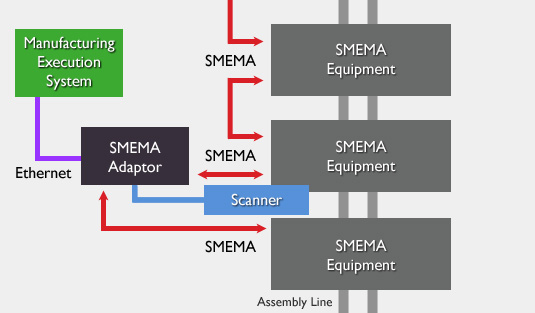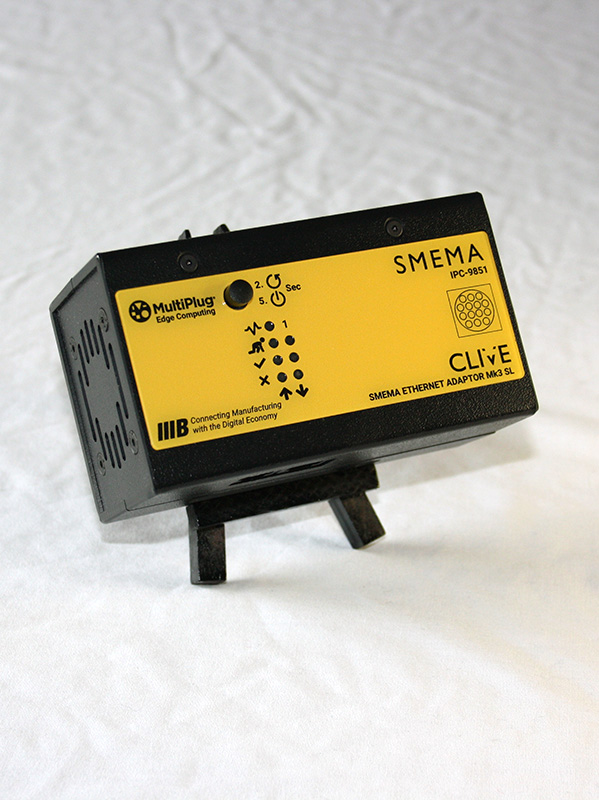

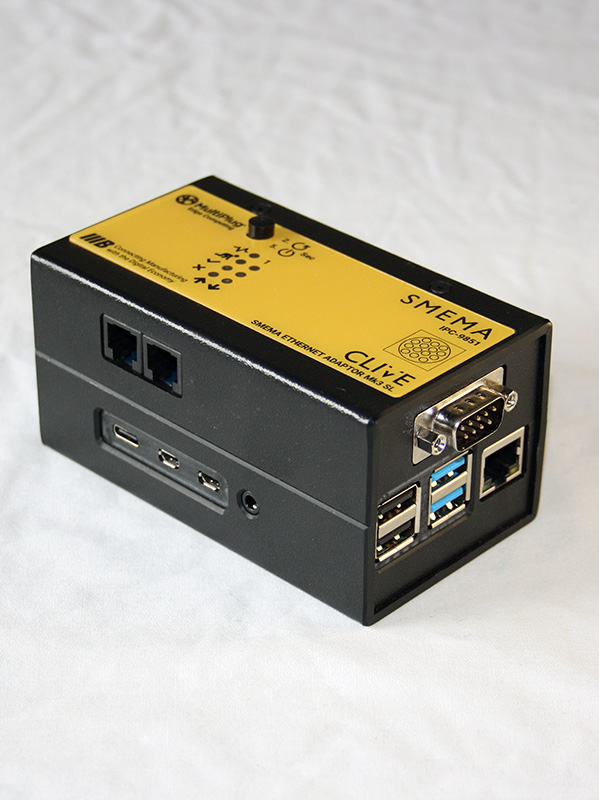
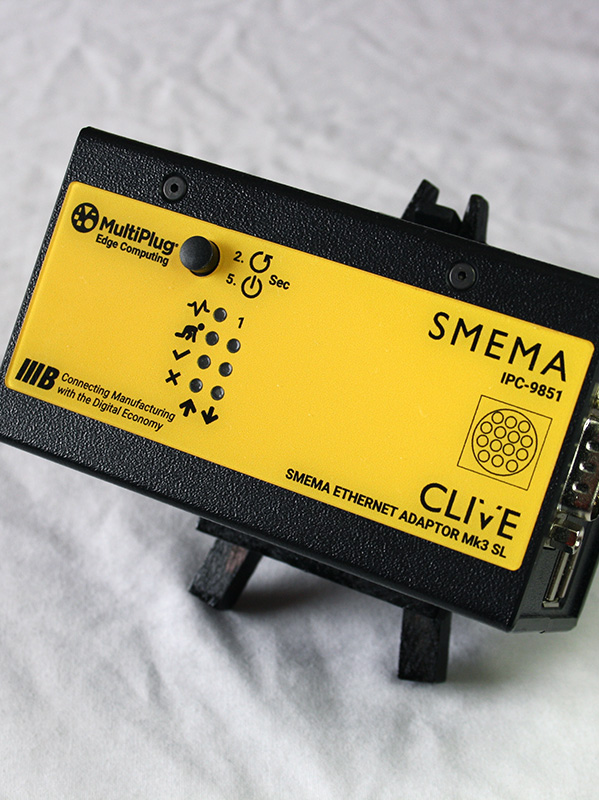
SMEMA Ethernet Adaptor
CLIVE : Single Lane (SL)
As we move towards a Smart Factory, IT Professionals and Solutions Engineers who traditionally work within the digital economy need to interact with legacy interfaces found on SMT production line equipment.
This adaptor allows such people to either interact with the raw SMEMA signals found on legacy equipment or using the MultiPlug Edge Computing Platform allows them to create a solution using building blocks of MultiPlug software extensions.
Such solutions may be to use SMEMA as an interlock to pause and check if a product should proceed down the production line to the next manufacturing equipment. To achieve this the Adaptor acts as a SMEMA middleman, not turning on either the Machine Ready SMEMA signal, or the Good/Bad Board SMEMA signal until the software check is made.
It is important to understand when purchasing this Adaptor that it is provided with no software solution apart from the MultiPlug as a building block so it’s wise to contact us first to collaborate with any possible solution. The MultiPlug SMEMA Extension provides basic Stop/Start of SMEMA signals using an event based architecture.
Software Engineers can also interact directly with the Adaptor’s I/O by creating their own software as the Adaptor runs a Linux operating system and is based on a single board computer. They can also create their own MultiPlug Extensions to handle bespoke functionality.
The Adaptor also features a RS232 serial port and 4 USB ports for connections to other equipment on the production line. A real time clock makes data logging possible.
CLIVE Mk3 SL
Interface with SMEMA using Ethernet connections and a event based architecture
- Compact Design
- Low Cost
- Speedy Setup
- Headless Device
- Software Extendable via the MultiPlug Edge Computing Platform
A product website can be viewed at: www.smema-ethernet-adaptor.info/
Typical Applications
- SMT Scan Station
- SMEMA Interlocking
- Data Logging
- Data Exchange
- MES Interlocking
- General I/O
- Upgrade path to The Hermes Standard and CFX Connected Factory Exchange
- MPN
- B5145C85
- HS Code
- 8517 62
- SMT Lane Configuration
- Single Lane
- Size
- Length 109 x Width 62 x Height 55 - Weight 227 grams
- Computer
- 2GB RAM, 32GB Storage. Linux. Single Board Computer
- Network
- Ethernet or WiFi. WiFi Access Point for remote setup and monitoring
- Input voltage
- 5 Volt Supply via USB-C - optional industrial 24v stepdown
- Connectors
- 2 x RJ12 SMEMA Sockets. RJ12 Plug to SMEMA Plug or Socket Dongles (optional accessory).
- Indicators
- SMEMA status and audible alarm indicator
- Buttons
- Shutdown / Restart
- Data
- RS232 Serial Port. 2 x USB 2.0. 2 x USB 3.0
- SMEMA Switching Max
- 30V DC
- Mount
- Din Rail, Magnetic or Wall
- Real Time Clock
- Yes. For accurate data logging
- Cooling
- Active
- MultiPlug Extension
- MultiPlug.Ext.SMEMA
Cables
Mounts
- SMEMA Adaptor Family Din Rail Mount
- SMEMA Adaptor Family Magnetic Mount
- SMEMA Adaptor Family Wall Mount
Power Supplies
What has been the typical reasons / benefits for using the adaptors?
The adaptor has been created to give IT professionals direct control of the raw SMEMA signals. This creates the opportunity to Stop and Start the production line by MES systems or local control.
Creating a SMEMA Interlock
- With this solution the Adaptor acts as a slave with the PCB verification being handled by a dedicated ScanStation. This will send the PCB ID to the MES for verification.
- When verification is complete either the ScanStation can directly message to the Adaptor to activate the SMEMA ‘Good/Bad Board’ signal, or the Adaptor can be pushed a message from the MES to activate the SMEMA ‘Good/Bad Board’ signal.
- Once the Downline SMEMA Machine Ready signal is active, after a set time, the SMEMA 'Good/Bad Board' signal will be deactivated for the process to happen again for the next PCB.
- This basic functionality is found within MultiPlug Extension MultiPlug.Ext.SMEMA
- Communications to the Adaptor can be achieved via http REST, Socket, Serial, or a bespoke MES connection that will need to be developed. The MultiPlug uses an Event based architecture.
- Monitoring can be conducted by a web browser based user interface. Due to the nature of the web browser based user interface, it can be accessed from mobile devices that have access to the local network or using adjacent equipment that features a web browser.
Items required:
Hardware:
- SMEMA Ethernet Adaptor
- USB-C Power Supply
- RJ12 to 14 way SMEMA connector (Male or Female) cable pair
Software:
- MultiPlug Edge Computing Platform - License Included
- MultiPlug.Ext.SMEMA - Required for the SMEMA State Machine
- MultiPlug.Ext.RasPi.GPIO - Required for the SMEMA I/O
- MultiPlug.Ext.Network.Sockets - Optional for Network Socket Connections
- MultiPlug.Ext.Network.Http - Optional for REST based Http Connections
- MultiPlug.Ext.Ports - Optional for Serial Port Connections
Connection Diagram
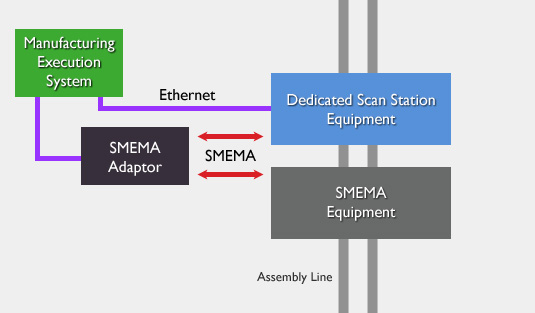
Creating a Scan Station
- With this solution the Adaptor processes a scanned PCB ID barcode and sends it to a MES for verification and activates the SMEMA signals.
- The scanning can be from a barcode reader, or a dedicated ScanStation connected to the Adaptor via the USB or the serial port of the Adaptor.
- When verification is complete the Adaptor will activate the SMEMA ‘Good/Bad Board’ signal.
- Once the Downline SMEMA Machine Ready signal is active, after a set time, the SMEMA 'Good/Bad Board' signal will be deactivated for the process to happen again for the next PCB.
- This basic functionality is found within MultiPlug Extension MultiPlug.Ext.SMEMA
- Communications to and from the Adaptor can be achieved via http REST, Socket, Serial, or a bespoke MES connection that will need to be developed. The MultiPlug uses an Event based architecture.
- Monitoring can be conducted by a web browser based user interface. Due to the nature of the web browser based user interface, it can be accessed from mobile devices that have access to the local network or using adjacent equipment that features a web browser.
Items required:
Hardware:
- SMEMA Ethernet Adaptor
- USB-C Power Supply
- RJ12 to 14 way SMEMA connector (Male or Female) cable pair
Software:
- MultiPlug Edge Computing Platform - License Included
- MultiPlug.Ext.SMEMA - Required for the SMEMA State Machine
- MultiPlug.Ext.RasPi.GPIO - Required for the SMEMA I/O
- MultiPlug.Ext.Network.Sockets - Optional for Network Socket Connections
- MultiPlug.Ext.Network.Http - Optional for REST based Http Connections
- MultiPlug.Ext.Ports - Optional for Serial Port Connections
Connection Diagram
